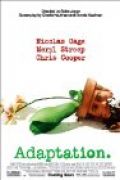
Directed by
Spike Jonze
114 minutes
Rated MA
Reviewed by
Mike Esler


Adaptation
Synopsis: Screenwriter Charlie Kaufman (Nicolas Cage) is commissioned to adapt a seemingly unadaptable novel to the screen.
With Adaptation, music-video trained directing prodigy Spike Jonze and supernova screenwriter Charlie Kaufman have collaborated to produce a technical, structural and acting triumph with knockdown entertainment at its heart and a dazzling array of cool effects and Hollywood nose-thumbing to keep even the most jaded filmgoer up and about for all its 114 minutes run time. Buyer beware - the film is no cerebral float-tank. If you're looking for a place to park your brain take your $12.50 to the zoo. From the innovative opening credit sequence to clever sub-textual use of charged dialogue and so-good-you-hardly-know-they're-there "twinning shots" of Charlie in a car/room/swamp conversing with Donald (his identical twin brother in the film, also played by Cage who, btw, is cousin to Sofia Coppola, Jonze's wife)) the film continually, nay, mercilessly drags us through a packed gallery of emotions from cringing humiliation through to hilarity, exultant joy and beyond. Only the great cinema collaborators have the power and creative synergy to hold us this tight. Move over Quentin, Charlie's pulled on the shades and a baggy cardigan to boot!
The tumultuous journey we take with real-life screenwriter Charlie Kaufman, as he struggles with the most painful case of writer's block since James Caan met Kathy Bates, is one redolent of a love affair, something we can all be touched by. Yet Charlie's love affair is with his latest project - the screen adaptation of the novel The Orchid Thief. The fact that he insists on maintaining its author's integrity by giving it his noblest efforts is killing him as surely as any unrequited love. Look for an exhilaratingly restrained performance from Cara Seymour as Charlie's love interest, Amelia. Meryl Streep as novelist Susan Orlean has a lot of fun with a meaty role and Chris Cooper the military-psycho-next-door-neighbour-gay-refusnik of American Beauty is quite wonderful as the orchid thief, LaRoche. He lends deft purpose to his role and stability to the careening storyline.
Adaptation deals with issues of passion and hey, you guessed it, adaptation - botanical, emotional and cinematic - as well as the relatively grassroots premise that we can only be true to ourselves by following our hearts and honest inner feelings - our true passions. It parallels Orlean and LaRoche's journey with Charlie's own, chopping time into juicy, often angst-filled increments and presents the story in fast paced packets of whimsy, surrealism and thought-provoking confrontation.
This film is as clever and intelligent as anything I've seen in an age. It verges on the brilliant and treats the viewer with respect. What troubles me is the wobbly sense that I can't decide whether or not I truly like this film. I could assuage this worry with the thought that a film as eccentric, as genuinely fresh and downright funky as this may leave judgements such as like in the it doesn't matter basket. Do we need to like Gaudi's Sagrada Familia to appreciate its grandeur and colossal architectural cheek? Probably not. And speaking of great unfinished works was it just me searching for an extra minute of denouement as the film finished? Another trick from Charlie and Spike no doubt, lest I carry away some nice neat perception of their work they would never approve of.
Comment (BH): That "extra minute" feeling" comes I think because of the disambiguation that occurs in the latter part of the film Charlie, struggling to realize his vision, takes his brother's advice and goes to screen-writing seminar held by industry guru, Robert McKee. Here McKee convinces Charlie that like really is like a Hollywood screenplay and Charlie dutifully writes in guns, drugs, a car chase, a crocodile attack! and a cheesily happy "ending" which Charlie affirms. This strategy enables the film to resolve narratively but betrays what makes it so appealing in the first place - Charlie's inherent refusal to conform to Hollywood conventions. Hence that feeling that "something" (a car crash like that of LaRoche's?) is going to happen to restore the film's integrity. Perhaps the film's real ending, with The Turtles song "Happy Together" playing over a time-lapse photography of a planter box of daisies, is meant to be taken ironically but if so Charlie is not only not aware of it but we can see that he has essentially duped himself. But then who has written this part of the film as it was not Charlie? Is it McKee's dreaded deus ex machina?
Want something different?





